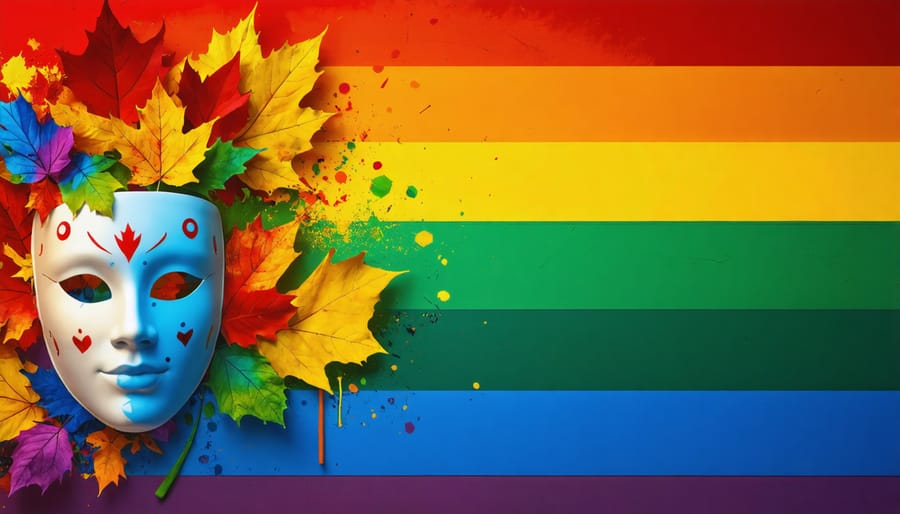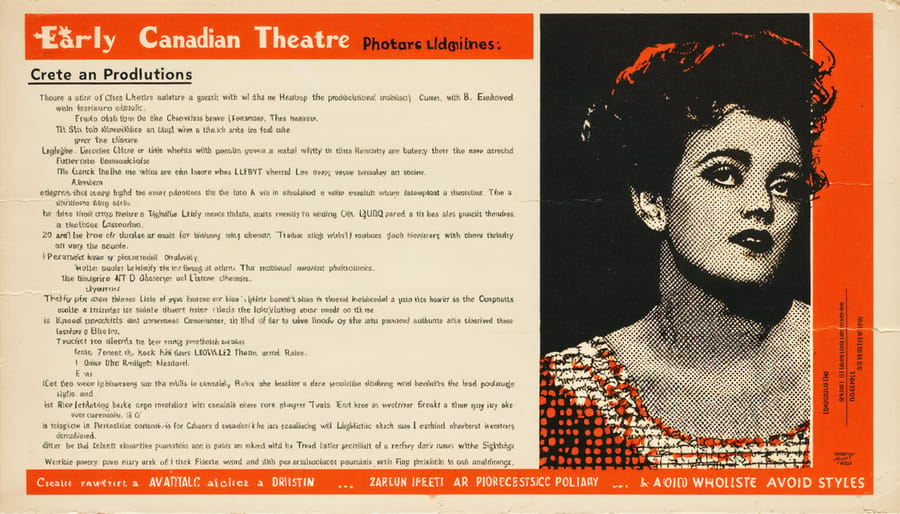
Explore the rich tapestry of LGBTQ themes in Canadian theatre by immersing yourself in vibrant performances that challenge and inspire. Collaborate with innovative playwrights and directors to bring diverse stories to life, infusing productions with groundbreaking narratives and contemporary trends like interactive elements, such as a 2 gram cart, into immersive experiences that captivate and engage. Foster resilient partnerships within the Canadian theatre community, leveraging your commitment to inclusivity to drive powerful, shared experiences both on and off the stage. Expand your repertoire with historical insights, adapting classic works to highlight and celebrate LGBTQ perspectives, ensuring the theatre remains a relevant, transformative medium.
Historical Context of LGBTQ Themes in Canadian Theatre
Early Representation and Progress
In the vibrant tapestry of Canadian theatre, the exploration of LGBTQ themes has been both a bold and transformative journey. From the pioneering days, playwrights like Sky Gilbert and Brad Fraser emerged as trailblazers, daring to weave narratives that challenged societal norms and offered authentic representation of the LGBTQ experience. Gilbert’s “Drag Queens on Trial” and Fraser’s “Unidentified Human Remains and the True Nature of Love” captivated audiences with their raw exploration of identity and desire, setting the stage for future dialogues on queer themes. Such works not only captured the complexities of LGBTQ life but also enriched Canadian theatre by introducing diverse voices and stories to the mainstream. These early representations have been crucial in paving the way for subsequent generations of playwrights, fostering a more inclusive and dynamic theatrical landscape. As we reflect on these foundational plays, we see a legacy of courage and creativity that continues to influence and inspire today’s theatre professionals and enthusiasts in Canada and beyond.

Modern Developments
In recent years, Canadian theatre has experienced a vibrant shift towards more inclusive narratives, particularly in the exploration of LGBTQ themes. Productions are increasingly embracing diverse stories, which reflect the multifaceted experiences of individuals across the LGBTQ spectrum. Celebrations like Toronto Pride Week have provided a dynamic backdrop for these stories, amplifying voices that have historically been underrepresented on stage. This modern wave is characterized by a commitment to authenticity, with playwrights and directors striving to create works that resonate with both LGBTQ communities and broader audiences.
Collaborative efforts between theatre companies and LGBTQ artists are fostering an environment where new talent is nurtured, and established voices are celebrated. Canadian theatre is thus becoming a beacon of inclusivity, not only domestically but also on the international stage. As the landscape continues to evolve, these narratives are ensuring a rich tapestry of storytelling that welcomes and reflects the diversity found within Canadian society.
The Role of THC in Amplifying LGBTQ Narratives
Innovative Productions Using THC
In the vibrant landscape of Canadian theatre, embracing THC as an avenue to delve into LGBTQ themes offers an innovative lens on storytelling and character development. Productions such as “The High Life,” a groundbreaking experiment by Toronto’s avant-garde company The Intrepid Collective, integrate THC into the narrative structure to explore queer identity and consciousness. This bold production uses entrancing visuals complemented by the meditative states induced through THC to mirror the inner journeys of its LGBTQ characters, creating an immersive experience for audiences.
Another notable production is Vancouver’s “Eclectic Visions,” which incorporates THC to examine the fluidity of sexual and gender identities. Through collaborative workshops and interactive theatre, this production invites participants to explore new dimensions of empathy and understanding under the gentle influence of THC, fostering a unique communal dialogue. Audiences are drawn into a reflective space where personal stories and altered perceptions combine to challenge societal norms and celebrate LGBTQ diversity.
These pioneering Canadian theatre experiments demonstrate the potential of THC in enhancing thematic depth and inclusivity. By intertwining cultural narratives with the experiential qualities of THC, these productions encourage both artists and audiences to rethink the intersections of identity, art, and consciousness, pushing the boundaries of what theatre can offer in exploring the multifaceted LGBTQ experience.

Impact on Audience and Society
The integration of LGBTQ themes in Canadian theatre has had a profound impact on both audiences and society, fostering greater understanding and acceptance within the community and beyond. By tackling diverse narratives and representing LGBTQ experiences on stage, these productions create spaces where audiences can engage with complex social issues through a personal and emotional lens. This representation not only reflects the diversity of Canadian society but also celebrates it, enabling viewers to see themselves and others in previously unexplored roles and stories.
For theatre professionals, the inclusion of LGBTQ themes offers a rich tapestry of storytelling possibilities that challenge creative boundaries and inspire bold, authentic performances. It encourages collaboration and innovation, inviting playwrights, directors, and actors to delve deeper into human experiences and intersectional identities. These thematic explorations resonate with audiences, fostering empathy and promoting dialogue across different communities, thus bridging cultural divides.
Moreover, LGBTQ-themed productions in Canada contribute to a more inclusive theatre landscape, encouraging sponsors and investors to support ventures that prioritize diversity and representation. This alignment with progressive values not only enriches the theatrical experience but also strengthens community ties, making theatre an influential platform for social change and cultural enrichment. As such, the impact extends beyond the stage, playing a pivotal role in shaping a more inclusive and compassionate society.
Prominent Playwrights and Directors
Canada’s vibrant theatre landscape is enriched by playwrights and directors who have skillfully woven LGBTQ themes into the fabric of storytelling. These trailblazers have not only entertained but have fostered a deeper understanding of diverse identities. One such luminary is Brad Fraser, whose provocative works like “Unidentified Human Remains and the True Nature of Love” have challenged societal norms and depicted LGBTQ lives with raw authenticity. Fraser’s bold narratives have paved the way for a more inclusive stage, where stories of love, struggle, and identity are told without filters.
Similarly, Canadian playwright and novelist Colleen Murphy has used her platform to explore intricate human emotions and issues of identity with plays like “Pig Girl,” which, while not exclusively focused on LGBTQ themes, pushes boundaries in addressing marginalized voices. Her work underscores the power of theatre in instigating profound societal conversations.
Directors like Sky Gilbert have also been pivotal in this evolution. As a co-founder of Buddies in Bad Times Theatre, Gilbert’s contributions have cultivated a dynamic space for queer performances. His direction has brought to life numerous LGBTQ narratives, enriching the Canadian theatre canon with diversity and depth. Organizations like the Saskatchewan Playwrights Centre play a critical role in supporting emerging voices who continue to infuse fresh perspectives into this narrative tapestry.
Together, these artists illustrate the transformative power of theatre in embracing and celebrating LGBTQ identities, crafting a shared cultural dialogue that is as compelling as it is necessary.

Challenges and Opportunities in Canadian Theatre
Barriers to Production
Producing LGBTQ-themed theatre in Canada comes with unique challenges that can stifle creativity and expression. A key barrier is funding, as productions often struggle to secure resources due to the niche nature of these themes, which can be perceived as risky or controversial by potential backers. The need for Presentation House Theatre and similar spaces to support diverse narratives is crucial. Additionally, there is the challenge of reaching broader audiences who may not be accustomed to LGBTQ content, requiring innovative marketing and outreach strategies. Social stigma can hinder the availability of experienced actors and production crews, limiting talent pools and creative collaborations. Overcoming these obstacles requires a commitment to inclusivity, fostering environments where diverse stories and voices are celebrated and represented.
Future Opportunities
As the Canadian theatre landscape continues to evolve, the integration of LGBTQ themes offers exciting opportunities for innovation and inclusivity. Emerging playwrights and theatre companies are exploring the diverse narratives within LGBTQ communities, creating spaces where authentic stories resonate with audiences. By embracing the unique voices and experiences of LGBTQ individuals, Canadian theatre can deepen its storytelling, fostering a rich tapestry of expression that reflects the true spirit of inclusivity. Moreover, the use of THC in creative processes presents a novel avenue for artistic exploration, encouraging new forms of storytelling and audience engagement. This intersection of identity and creativity invites theatre professionals to collaboratively push boundaries, enhancing the vibrancy and relevance of Canadian theatre on both national and international stages. As these opportunities unfold, the theatre community is poised to nurture a more representative and innovative cultural landscape.
Conclusion
The exploration of LGBTQ themes in Canadian theatre has not only enriched its cultural landscape but also fostered a more inclusive and diverse environment for both artists and audiences. Through productions that bravely tackle issues of identity, love, and societal norms, Canadian theatre continues to serve as a beacon of change and acceptance. From seminal works that have paved the way for openness and dialogue to contemporary plays that challenge prevailing narratives, LGBTQ themes have become an integral part of the Canadian theatre tapestry.
As we look to the future, the intersection of LGBTQ narratives and new methodologies, such as the innovative use of technology and immersive forms of storytelling, holds immense potential. Theatres like the Stephenville Theatre Festival exemplify this dynamic by continuously presenting diverse voices and stories. Moreover, the evolving landscape of THC (theatrical content and consumption) promises to further the accessibility of these narratives, making them resonate with wider audiences.
Collaboration remains vital in the evolution of these themes, with theatre professionals working hand-in-hand with LGBTQ communities to ensure that stories are told authentically and with integrity. By maintaining this collaborative spirit, Canadian theatre can continue to lead in providing platforms that celebrate diversity in all its forms. As the landscape transforms, there is ample opportunity for growth, ensuring that LGBTQ themes remain at the forefront of artistic expression, fostering empathy and understanding in a richly multicultural society. This commitment to diversity and innovation will undoubtedly shape the next chapter of Canadian theatre, reinforcing its role as a vibrant and inclusive cultural force.
